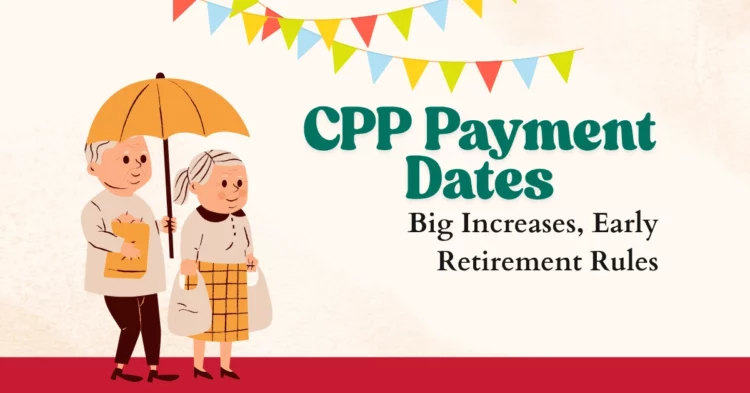The Canada Pension Plan (CPP) is a critical source of income for retired Canadians, and 2025 brings several updates to CPP payment amounts, eligibility questions, and benefit rules. From CPP payment dates to how much you can expect each month — and even whether you can receive CPP outside Canada — here’s a complete breakdown.
Table of Contents
CPP Payment Dates 2025
CPP is deposited monthly by the Canada Revenue Agency. Here are the confirmed CPP payment dates for 2025:
- January 29
- February 26
- March 27
- April 28
- May 28
- June 26
- July 29
- August 27
- September 25
- October 29
- November 26
- December 22
If you’re a senior or a CPP recipient, you can expect to receive your CPP payment on these dates directly into your bank account.
Will Seniors Get Extra Money in Canada 2025?
Yes. CPP payments increased by 4.4% in January 2025, providing more support to seniors in response to inflation and the ongoing CPP enhancement program. This increase ensures that retirees maintain their purchasing power, especially as the cost of living continues to rise.
How Much Will a CPP Cheque Increase in 2025?
The maximum monthly CPP retirement benefit increased to approximately $1,433 in 2025, up from $1,364. This amount is only available to individuals who made maximum contributions to CPP for at least 39 years. The average monthly CPP payment at age 65 in early 2025 is around $844.58–$1433, depending on individual contribution history.
What is the 10-Year Rule for CPP?
To qualify for a CPP survivor’s benefit, the deceased contributor must have made contributions for at least:
- 10 calendar years, or
- One-third of the number of years in their contributory period (minimum 3 years)
This rule ensures that survivors are eligible for CPP benefits if the contributor had a significant work history in Canada.
Can You Live Outside of Canada and Collect CPP and OAS?
Yes, you can live outside of Canada and continue to receive CPP payments, as long as you were eligible before leaving. However, for Old Age Security (OAS), you must have lived in Canada for at least 20 years after turning 18 to continue receiving it abroad. If not, OAS will stop after six months of absence from Canada.
At What Age Do You Stop Paying CPP?
Canadians are required to contribute to CPP if they earn more than $3,500 annually until the age of 65. After 65, contributions are optional but may still benefit you. You can continue contributing until age 70, which can help increase your post-retirement CPP payments.
What is the Youngest You Can Collect CPP?
You can start receiving your CPP retirement pension as early as age 60, but your monthly benefit will be permanently reduced by 0.6% for every month before your 65th birthday. That means a 36% reduction if you start at 60.
Can CPP Be Passed On to Children?
Yes. CPP includes children’s benefits for dependent children of disabled or deceased contributors. To qualify, the child must be:
- Under age 18, or
- Between 18 and 25 and attending school full-time
In 2025, the flat-rate monthly children’s benefit is available in addition to survivor or disability benefits.
Summary Table of Key Questions and Answers
| Question | Answer |
|---|---|
| CPP payment dates 2025 | Monthly on scheduled dates (e.g., July 29, 2025) |
| Will seniors get extra money in 2025? | Yes, with a 4.4% increase in January 2025 |
| Average CPP at age 65 | $844.58 to $1433.00 monthly |
| Maximum CPP in 2025 | $1,433 per month for full contributors |
| What is the 10-year rule for CPP? | 10 years of contributions or 1/3 of contributory period |
| Can CPP be collected while living abroad? | Yes, for CPP; OAS requires 20 years of Canadian residency |
| When do CPP contributions stop? | Mandatory until 65; optional until 70 |
| Earliest age to collect CPP | Age 60 (with 36% reduction) |
| Can CPP be passed on to children? | Yes, through the children’s benefit for dependents |
Final Thoughts
The CPP payment dates for 2025 are consistent, and with a 4.4% increase in benefits, seniors will see a boost in their monthly income. Whether you’re planning to retire early, considering survivor benefits, or living abroad, understanding how CPP works helps you make informed decisions for your financial future. Check your eligibility and monitor your My Service Canada Account to stay up to date with your payments.
